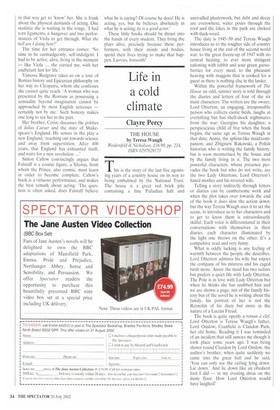Life in a cold climate
Clayre Percy
THE HOUSE by Teresa Waugh Weidenfeld & Nicholson, 116.99, pp. 224, ISBN 0297829173 This is the story of the last five agonising years of a country house on its way to being embalmed by the National Trust. The house is a great red brick pile containing a fine Palladian hall and
unrivalled plasterwork, but debt and decay are everywhere, water pours through the roof and the lakes in the park are choked with duck-weed.
The date is 1945-50 and Teresa Waugh introduces us to the rougher side of country house living at the end of the second world war: to the great freeze-up of 1947 with no central heating; to ever more stringent rationing with rabbit and sour green gooseberries for every meal; to the pheasant heaving with maggots that is cooked for a guest as there is nothing else in the larder.
Within the powerful framework of The House an odd, sinister story is told through the diaries and letters of four of the six main characters. The writers are the owner, Lord Otterton, an engaging, irresponsible person who collects exotic birds, laughs at everything but has shell-shock nightmares from the war; Georgina his daughter, a perspicacious child of five when the book begins, the same age as Teresa Waugh at that date; Annie, the sphinx-like maid/companion; and Zbigniew Rakowski, a Polish historian who is writing the family history, but is soon mesmerised by the house and by the family living in it. The two most powerful characters, whose presence pervades the book but who do not write, are the two Lady Ottertons, Lord Otterton's hated mother and his revered wife.
Telling a story indirectly through letters or diaries can be cumbersome work and when the plot takes over towards the end of the book it does slow the action down; but the way Teresa Waugh uses it to set the scene, to introduce us to her characters and to get to know them is extraordinarily skilful. Each voice is differentiated in their conversations with themselves in their diaries, each character illuminated by the light one throws on the other. It's a compulsive read and very funny.
What is oddly lacking is any feeling of warmth between the people she describes. Lord Otterton admires his wife but enjoys the company of his mistress and his caged birds more. Annie the maid has two suitors but prefers a quiet life with Lady Otterton. The Pole is in love with Lady Otterton but when he thinks she has snubbed him and we are shown a page, not of the family history but of the novel he is writing about the family, his portrait of her is not the Reynolds of his diary but more in the nature of a Lucian Freud.
The book is quite openly a roman a clef. Lord Otterton is Teresa Waugh's father, Lord Onslow; Cranfield is Clandon Park, her old home. Reading it I was reminded of an incident that still annoys me though it took place some years ago. I was being shown round Clandon by Lord Onslow, the author's brother, when quite suddenly we came into the great halt and he said, 'You can only see the ceiling lying down. Lie down.' And lie down like an obedient fool I did — in my evening dress on the dusty floor. How Lord Otterton would have laughed!


























































 Previous page
Previous page